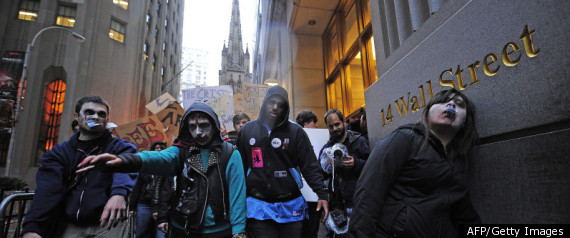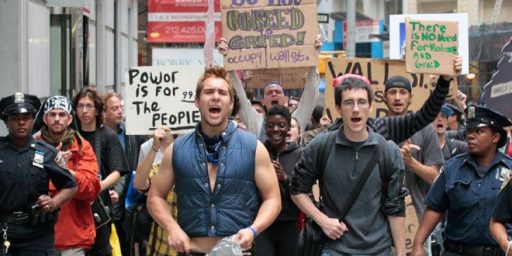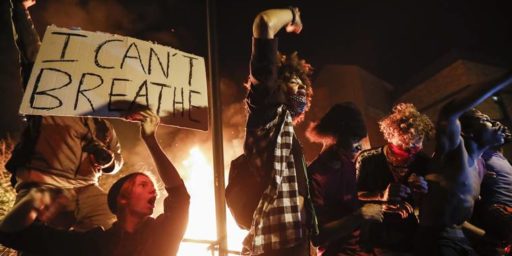A Lesson For Occupy Wall Street: Get Involved, Or Go Home
Not surprisingly, people who are politically involved tend to be the ones that politicians listen to.
Nate Silver took a look at the political positions of the so-called “one percent” recently, and one of the tidbits stands out:
In the Chicago sample, 99 percent reported voting in 2008; in the 2008 American National Election Study, only 78 percent of a nationally representative sample reported voting. Both numbers are probably inflated – nowhere near 78 percent of Americans actually voted in 2008 — but it seems unlikely that misleading survey responses would fully account for the gap between the 1 percent and Americans as a whole. Other measures of participation show even larger gaps. For example, 41 percent of the very wealthy reported attending a political meeting. Only 9 percent of Americans did so in 2008. And 68 percent of the very wealthy reported giving money to a political candidate, party, or cause in the last four years. In 2008-a year in which “small donors” were numerous-only 13 percent of Americans donated to a political candidate or party. Again, there are small differences in the wording of the questions between the two surveys, but they are not likely responsible for the 55-point gap.
Matthew Yglesias comments:
There’s considerable evidence that the rich have a much higher proclivity to actually show up and vote. I always liked the old Woody Allen line about how 90 percent of life is just showing up, and part of the story of the top one percent is that they show up. The median American household is economically struggling in a variety of ways, but isn’t so cash strapped as to be incapable of offering a political donation or two. Indeed, the American middle class is pretty passionate about donating to church groups and other charities. If more of that energy were directed into the political process, politicians would pay more attention. But as things stand, the wealthy are more highly engaged across the whole range of activities and so the political process is heavily tilted in favor of their preferences.
In other words, if you spend your time hanging out in parks rather than actually getting involved in the political process, you’re not really going to accomplish anything. The same goes with trying to shut down ports, as Occupy Oakland tried to do last week. The Tea Party learned this lesson rather quickly, and notwithstanding the fact that they put forward several candidates that were, to put it mildly, kooks (i.e., O”Donnell, Angle, Miller) they were nonetheless quite effective in 2010, and they’ve been just as effective in 2011 in holding those newly elected representatives feet to the fire. The Tea Party succeeded because it focused limited issues and limited goals, and because it worked within the system rather than merely standing outside it yelling clever slogans. It’s not easy, it’s not always necessarily fun (sitting in a campaign office stuffing envelopes can be pretty darn boring, you know), but it’s how things work in this country. If you don’t even try to get involved any change things, then your complaints just end up being so much noise in the background.
It’s been three months since the Occupy protests began and all we’ve really seen is an incoherent agenda, disruptions to local life, and more arrests than ever occurred in the entire history of the Tea Party protests. Instead camping out during the autumn, these people would have done themselves much better had they gotten involved in the political process. Instead, the seem to still revel in the fact that they have no real goals, no legislation they want to get passed, and no message that the rest of America can relate to, then they’re going to find themselves left behind in 2012. Get involved, or go home, but don’t complain about the system if you don’t even bother trying to do anything to change things. If that’s the course they choose then, I’ll just have to think that my initial opinion of this entire movement was correct.







I don’t remeber any, just saying.
In which Doug proves that the combination of being politically active and having a billion dollars in one’s pants can be highly effective in influencing laws.
But mostly the billion dollars part.
Drum Circles
C’mon Doug, you are a libertarian…How much more useless can you be?
Economist Steven Landsburg made the case that poor people should not vote, and should instead play the lottery. It all has to do with energies and expected outcomes.
As an illustration, OWS got this blog post for showing up … but not at the ballot box.
(I wonder how many of the 1% have someone handling the tedium of an absentee ballot? Does having a personal assistant change outcomes?)
lol….
Dirty hippies, causing trouble and getting arrested.
Just think how much better our history would have been if the founding fathers had been pussies who only played by the rules and did not dream of getting out of line because they might get in trouble.
@Hey Norm:
Check out the picture Norm.
Its Drum Circles with Zombies!!
how cool is that…..
More or less what I always assumed. They’re too lazy and dumb to make any material difference.
Doug is spot-on. To succeed in the game, you’ve got to play the game. If you deny that it’s a game, well, then, you’ve got some growing up to do.
Yeah, that’s how the Civil Rights movement succeeded, by playing the game.
Oh, wait: no. They sat in and they protested in the streets, changed minds and earned the support of the white majority. 10% of the vote (African-Americans) wouldn’t have been nearly as effective as changing the minds of the majority.
Gays, the same thing. No love at all until Stonewall. From that point on it was a propaganda war, not a vote-counting battle. They had to change the minds of the majority, which they did, with demonstrations, art, media, etc…
Which makes Doug 0 for about 100 posts on OWS.
@michael reynolds:
It’s just the same post repeated. And we make the same comments every time.
Heh. You could be right, qtip. Have you ever read 10-year-old blogs (many bloggers maintain archives)? It’s quite depressing to realize that nothing, NOTHING, changes.
Drum circles of yesteryear…
http://www.youtube.com/watch?v=BZ5B7yqDYbA
@anjin-san: Cooool Man! Groooovey! Hep Cats!
michael reynolds:
vs.
Doug Mataconis:
The contrast between these two statements could not be more stark, nor more damning.
@de stijl:
Why are my bolckquotes randomly bolded?
Shorter Doug:
“I hate OWS, but I just can’t quit them.”
I’m going to try that one on the singles scene. “I have a billion dollars in my pants .. “
@qtip: Heh. Doug’s OWS posts–catnip for page views.
@john personna: I don’t see why you’d deny OTB the pleasure of making fun of the very stupid and the very annoying.
Doug,
You keep eliding by the issue of power, and you’re making causational argument when all you have is correlation. According to the polls Silver cites, money and political activity are correlated, that’s all.
Now, having gobs of money isn’t necessary for political action, but it certainly helps. Said gobs of money both make it easier to devote more time to political (or other non-wage earning) activities. Furthermore, you’re much more likely to be taken seriously and perhaps even given a media platform if you have gobs of money to reinforce your views (see: Trump, Donald). To whit, from the very Silver article you cite:
Now, it could be random chance that the the national agenda is also laser focused in the issue of the deficient, or it could be that the wealthiest 1% might might use their money and influence to make sure their preferred views dominate the political discussion.
I’m sure the huge financial backing of Freedom Works, Fox News, et. al. played a pertinent part to the Tea Party’s visibility as well.
You just can’t hide your contempt, can you? There’s far more, and far more challenging avenues of political action than envelope stuffing, or blog-post writing. Like, say, protest.
Doug,
God lord, did you even read Silver’s conclusions?